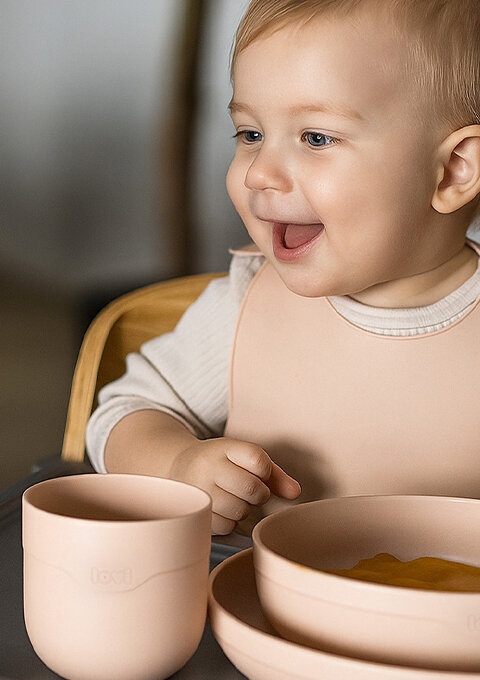Read this article to learn what is a cow's milk-free diet and what you give should a baby with a cow's milk protein allergy.
Expert consultant: Danuta Chrzanowska - Liszewska, MD, paediatric specialist and neonatologist
If your baby has been diagnosed with cow's milk allergy (also known as cow's milk protein allergy or CMPA), you should introduce a cow's milk-free diet. This is an elimination diet, which involves avoiding products that contain cow's milk proteins, such as milk and cow's meat, and other products that can cause cross-reactivity.
How do I know if I should eliminate cow’s milk from my baby's diet? Symptoms can vary, including digestive issues, skin problems, and respiratory issues. Your baby may have a bloated tummy, suffer from colic, spit up frequently, or have trouble gaining weight. Some babies may also have skin reactions such as dry skin, and rashes with red lumps on the cheeks, behind the ears, and on their limbs. Wheezing and coughing may also occur. These symptoms are caused by an allergic response to cow's milk proteins, which the baby's immune system mistakes as harmful. The reaction can occur immediately or a few hours after contact with the allergen.
Your child is more likely to have a cow's milk allergy if one or both parents, or their siblings have allergies as well. If a cow's milk allergy is suspected, specific allergy tests may be performed to confirm the diagnosis. If your baby has been diagnosed with CMPA, the appropriate treatment is a cow's milk-free diet.
A milk-free diet can be challenging, as milk is the basis of a baby's diet. To eliminate the risk of vitamin and micronutrient deficiencies, we advise you to consult a paediatric dietitian.
CMPA is not a reason to wean a baby. Breastmilk is the best food for a baby up to the age of 6 months. To combat the allergy, you should introduce a milk-free diet for breastfeeding mums.
A milk-free diet (also known as a dairy-free diet) for breastfeeding mothers eliminates products that contain cow's milk proteins such as milk, milk powder, whey, cream powder, lactoferrin or casein. If you are breastfeeding and you have been advised to start such a diet it is important to avoid consuming milk, yoghurt, cheese, ice cream, puddings, chocolate, cakes, sauces, ready meals, sandwich spreads and even some medicines. Be sure to check product labels for ingredients derived from milk.
Breastfeeding mums on a dairy-free diet are recommended to take Vitamin D and calcium supplements.
If there is a risk of the allergy, a doctor may recommend a hypoallergenic formula. A hypoallergenic formula (HA) contains partially hydrolysed (broken down) protein, making it easier to digest and reducing the risk of allergy.
A dairy-free diet for an infant with a confirmed allergy consists of replacing milk with milk substitutes. There are many infant formulas without allergenic proteins available, but it is important to consult a paediatrician before making a decision on which milk substitute to use. Your paediatrician will help you choose the best replacement.
Plant-based drinks cannot replace milk and should not be used as a milk substitute in case of milk allergy. Plant-based drinks do not contain adequate amounts of nutrients, and using them instead of a specially formulated infant formula can increase the risk of deficiencies.
Due to the risk of arsenic contamination, it is advisable to avoid giving rice-based vegetable drinks to infants, young children, and pregnant women as it can be dangerous.
Although soya-based drinks do not contain cow's milk proteins, they can cause allergies. It is recommended to avoid giving soya-based formulas until your baby is 6 months old.
If you have already started introducing solid foods, you can use plant-based drinks as a supplement. It is important to choose those that do not contain sweeteners.
Children with a cow's milk protein allergy may also be at risk for allergic reactions to goat's and sheep's milk proteins due to cross-reactivity. Furthermore, it is not recommended to give goat's and sheep's milk to babies under one year old as a milk substitute because it does not contain adequate amounts of vitamins and minerals essential for a growing baby.
Allergy to cow's milk proteins occurs early in life and is often due to the immaturity of the immune system. Although feeding a baby with such an allergy and following an elimination diet can be challenging, it is worth noting that half of all children outgrow the allergy by their second birthday, and 90% by the age of.
Infant gruels are a very important part of your baby's diet. They supply to the demanding body of your baby components necessary for his correct development, including calcium, iron, magnesium, and are supplemented with vitamins, ...
It is said that no child is born a poor eater. Each of us arrives into the world with a natural survival instinct, and this requires eating. However, if your baby has become a poor eater, here you will find some suggestions ...
There comes a moment when mum's breast alone is not enough. Here you can find tips when and how you should introduce new components into your baby's diet.
Read how diet can help a baby to strengthen his immune system, so no illness thwarts your plans for active time outdoors.
